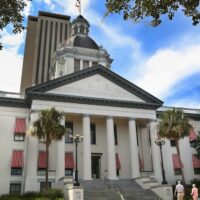New Florida Statute Requiring Resource and Benefit Information for Individuals with Disabilities

On June 16th, Governor DeSantis signed a bill into law requiring more information to be provided to persons with disabilities for services that are available. The purpose of the law is to provide information for services available for persons with disabilities other than services on the Medicaid Home and Community-Based Services (HCBS) waiver. One of my biggest frustrations as a person that provides information and legal services to persons with disabilities is the lack of information available so persons with disabilities or their caregivers know what services are available and how to obtain the services. The knowledge barriers and the administrative barriers to obtaining services often makes these services unavailable to most persons with disabilities who need these services.
Florida has an incredible shortfall of revenue for persons with disabilities who need services to be able to live in the community. People who live with an intellectual or developmental disability (cerebral palsy, autism, spina bifida, Down syndrome, Phelan-McDermid syndrome, or Prader-Willi syndrome) are eligible to receive services in the community through Florida’s HCBS waiver, known as iBudget Florida. Florida entered into a HCBS waiver agreement in the early 1980s with the Federal Centers for Medicare and Medicaid Services to provide community options in lieu of building more institutional placements for individuals with developmental disabilities. Eligible persons on the waiver receive 26 types of supports and services to assist individuals to live, learn, and work in their community, including residential rehabilitation, behavioral services, personal supports, adult day training, employment services, and occupational and physical therapy. Individuals who do not receive waiver services may still qualify for other benefits through Medicaid.
According to the Agency for Persons with Disabilities, on average, institutional care is approximately $ 135,000 per person each year while the average expenditure on the waiver is approximately $ 37,000 per person annually. Over 70 percent of the individuals served on the waiver continue to live in their communities with their families or independently which reduces the need for more costly services in out-of-home living arrangements such as group homes. Notwithstanding this tremendous savings, there continues to be a unsatisfied need for the waiver and waiver services and the need for such services through the waiver far exceeds the demand. Currently, there are 35,000 individuals receiving waiver services through iBudget Florida, and as of December 1, 2020, 22,718 eligible persons with disabilities are on the waiting list to receive waiver funding and services. From July 2019 and July 2020, 1,200 individuals were placed on this wait list.
Because of the limited funding, for the past few years, persons on the wait who met the who met the crisis or other priority needs (contained in § 393.065) would obtain priority placement on the waitlist and would receive waiver services when a space became available. As a result, close to 40% of those individuals on the wait list have been on the waitlist for more than 10 years, Once a person receives the waiver, funding for each individual is decided by an algorithm that determines the amount they receive. If additional services are needed, they are reviewed for medical necessity and may be allowed through a review process. Here we get into the administrative barriers to obtaining services as mentioned above.
Because of the tremendous need for additional services, and the failure for the legislature to allocate sufficient resources to ensure that all persons who are eligible for waiver services receive them, a bill was passed this legislative session to ensure that the Agency for Persons with Disabilities provides information regarding other programs, agencies, or services for which the persons with disabilities may be eligible to receive assistance. This information includes:
- A brief overview of the vocational rehabilitation services offered through the Division of Vocational Rehabilitation;
- A brief overview of the Florida ABLE program;
- A brief overview of supplemental social security income benefits and social security income benefits;
- A statement indicating that the applicant’s local school district may provide specialized instructional services, including transition programs, for students with special education needs;
- A brief overview of programs and services funded through the Center for Students with Unique Abilities, including contract information for each state-approved Florida Postsecondary Comprehensive Transition Program;
- A brief overview of decision-making options for persons with developmental disabilities, guardianship programs, and alternatives to guardianship;
- A brief overview of the referral tools made available through APD; and
- A statement informing the applicant that some waiver providers may serve private pay individuals.
As the information portal has yet to be developed, I have many hopes for what would be included as well as areas that I know will not be included – that should be.
Primarily, many types of services can be used in conjunction with one another. For example, persons who have the HCBS Waiver are also eligible for services for Vocational Rehabilitation or any of the other programs listed above. For instance, job coaches or life coaches are available from vocational rehabilitation as well as through the Waiver, and the waiver could be used to provide additional services after the time frame for employment services have expired.
There are many programs and services available from state and federal agencies that are not disability-specific agencies. All of these agencies must provide accommodations and often, additional services, so persons with disabilities can have equal access to the programs. For example, a person with a disability can get a higher payment standard on their Section 8 Housing Voucher if necessary, to live in a certain area that may have better transportation or employment options, or services may be available associated with the justice system.
Additional funding would always be the best option to ensure that persons with disabilities are provided with the services necessary. However, a very close second is to know where and how necessary services can be obtained.













